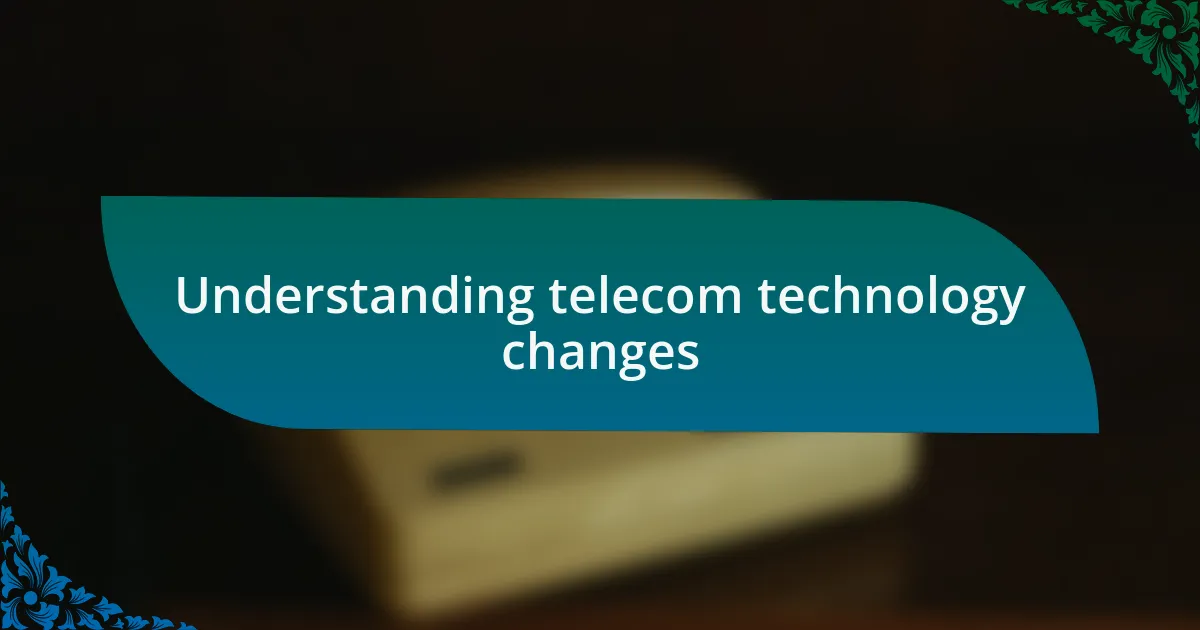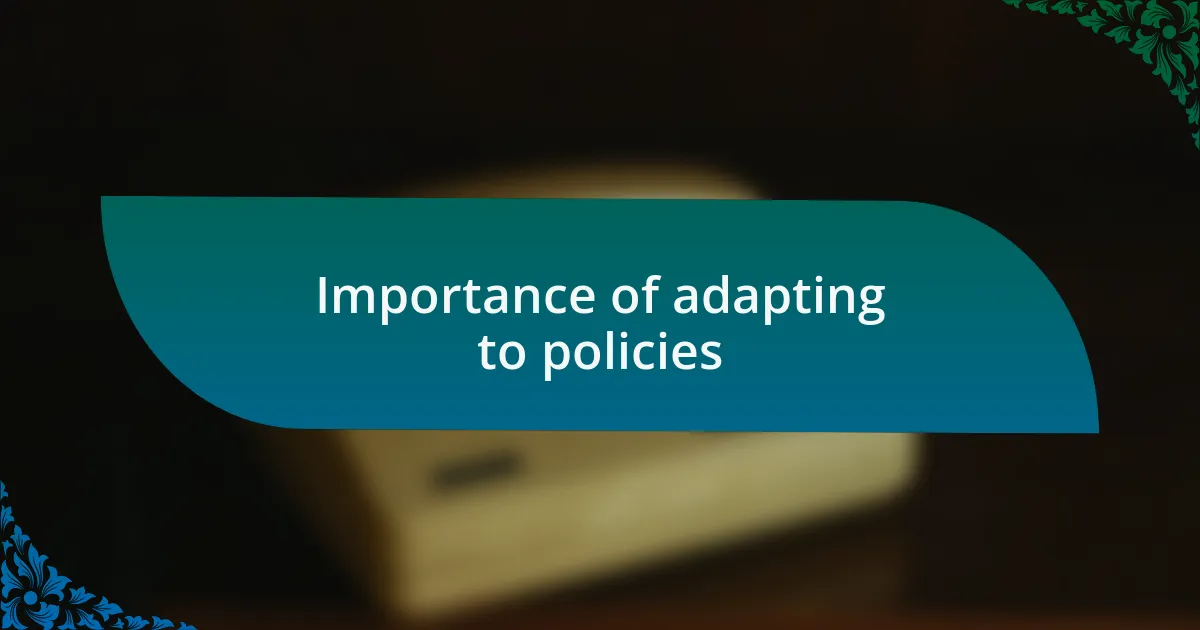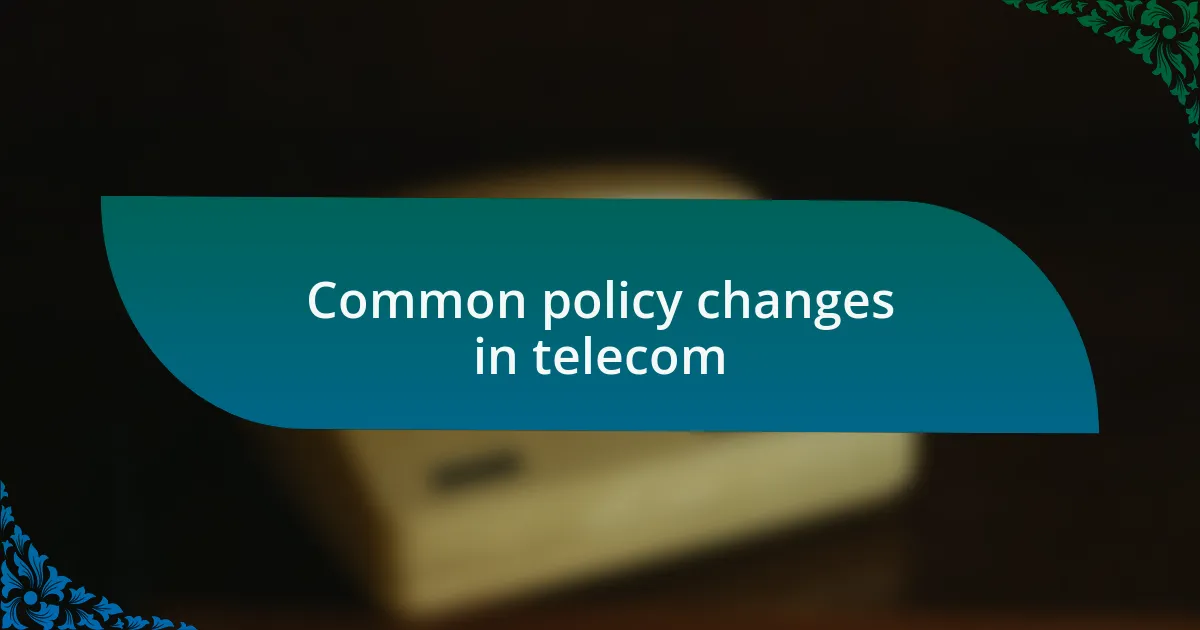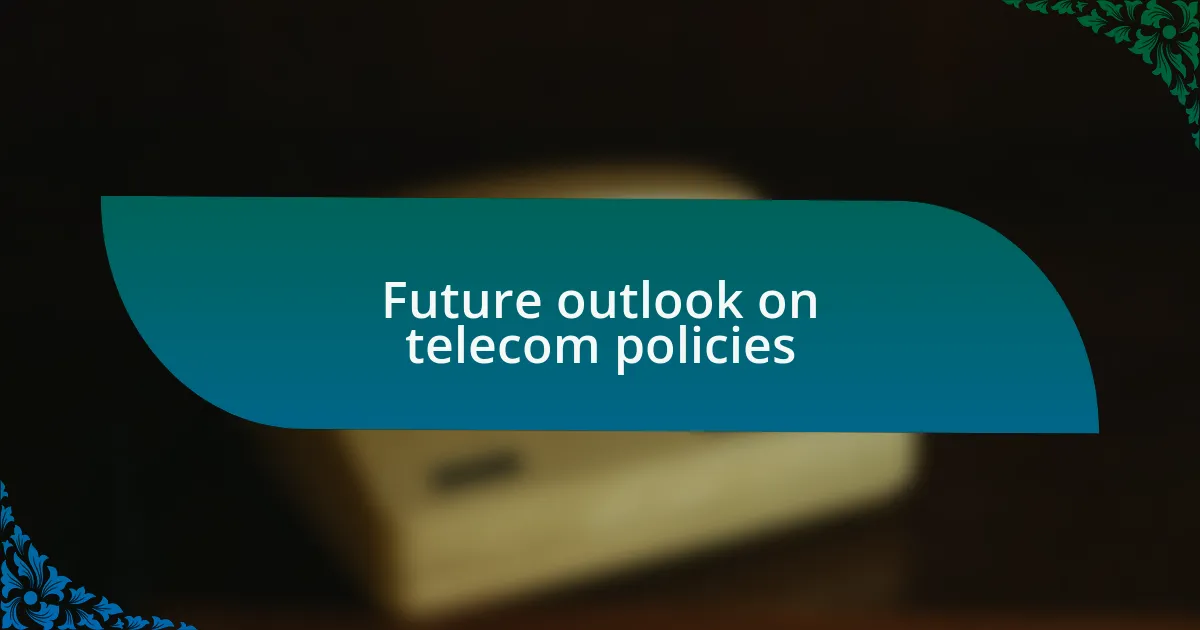Key takeaways:
- Telecom technology changes are influenced by both innovation and regulatory policies, impacting both consumers and businesses.
- Adapting to new policies, such as GDPR, is crucial for ensuring data security and improving service delivery.
- Staying informed through resources like newsletters, webinars, and professional organizations enhances adaptability in the evolving telecom landscape.
- Future telecom policies will likely be shaped by emerging technologies, emphasizing the need for collaboration among stakeholders to address both innovation and privacy concerns.

Understanding telecom technology changes
Telecom technology is constantly evolving, and understanding these changes can sometimes be overwhelming. I remember when I first encountered the shift from 3G to 4G networks; it felt like the entire world had changed overnight. Have you ever noticed how quickly a new technology can make older systems feel obsolete? Grasping these advancements requires curiosity and a willingness to learn.
As we delve deeper into these changes, we often discover not just new devices or faster speeds but also the underlying policies that shape our experiences. I once attended a workshop on emerging telecom regulations, and it opened my eyes to how policies impact everything from data privacy to network accessibility. It made me realize that staying informed isn’t just about the tech itself; it’s also about how these regulations affect our day-to-day lives.
Reflecting on my journey, I’ve learned that adapting to telecom changes means embracing both innovation and the policies guiding them. There was a time when I resisted embracing new technologies, but I quickly realized that understanding these shifts could enhance not only my professional skills but also my personal connectivity. How do you feel about the emerging technologies? Are you ready to embrace the changes and explore what they mean for your own life?

Importance of adapting to policies
Adapting to changing policies in the telecom sector is essential for both businesses and consumers. I recall a time when I had to quickly familiarize myself with GDPR regulations because my work involved handling personal data. Not only did I have to adjust my approach to compliance, but I also had to rethink the way I communicated with clients about their data rights. Have you faced a similar challenge?
The reality is that policies are intertwined with technological advancements. For instance, when the industry shifted to cloud-based services, I noticed regulatory changes that impacted data storage and access. Navigating these changes can be daunting, but understanding them is crucial for ensuring security and privacy. What experiences do you have with these regulatory shifts?
Ultimately, being adaptable allows us to seize opportunities arising from new regulations. I remember a project where new policies encouraged innovation in service delivery and improved customer satisfaction. This experience taught me that while adapting may take effort, it also opens doors to better engagement and responsiveness to customer needs. So, how can you prepare to adapt in this ever-evolving landscape?

Common policy changes in telecom
The telecom industry often sees common policy changes related to data privacy and net neutrality. I vividly remember the excitement and anxiety surrounding the introduction of the General Data Protection Regulation (GDPR). Suddenly, everything felt more serious; we had to rethink how we handled customer information, leading to a significant overhaul in our strategies. Have you ever imagined the ripple effect such regulations can have on everyday operations?
Another area that frequently undergoes changes is spectrum allocation and management. I once participated in a workshop that discussed emerging policies on spectrum sharing, which sparked a heated debate among providers. It was fascinating to witness how these policies could enhance service delivery while also stirring concerns about competition. Have you ever found yourself torn between the advantages and drawbacks of such regulations?
Furthermore, changes in interconnection agreements often impact telecom relationships and revenue models. I recall a negotiation where new terms significantly altered our telecommunications partnerships. The experience taught me the importance of staying informed and flexible, as what seemed like a setback ultimately led to innovative cooperative ventures. How do you think you could leverage policy changes to foster better collaborations in your own work?

Strategies for staying informed
Staying updated on policy changes in the telecom industry requires a proactive approach. I realized the importance of subscribing to industry newsletters and attending webinars early in my career. These resources not only keep you informed but also provide a platform for dialogue with experts. How often do you take advantage of these opportunities to learn and connect?
Another effective strategy is joining relevant professional organizations. I remember my first conference; it was a golden opportunity to network and discuss the latest policies with fellow professionals. Engaging with peers in this way has truly enriched my understanding and kept me ahead of the curve. Have you found value in these kinds of interactions?
I also recommend dedicating time each week to research and reading up on recent developments. When I started carving out this time, I felt more empowered in my role, as I could anticipate changes rather than react to them. It’s amazing how being informed can shift your perspective and influence your decision-making. What strategies have you found effective in staying current with industry changes?

Personal adaptation methods
Personal adaptation methods vary significantly from person to person, but I find that embracing change often starts with a mindset shift. When faced with unexpected policy changes, I took a moment to reflect on how these shifts could actually open new doors rather than close them. I vividly recall the time I adjusted my approach to customer interactions after a major regulation change; instead of viewing it as a barrier, I saw it as a chance to enhance service quality. Have you ever reframed a challenge in this way?
In my experience, developing personalized routines has been crucial for managing adaptation. For instance, I created a weekly review session where I reflect on new policies and how they impact my work. Initially, this felt tedious, but as I started to see the broader picture and its relevance to my goals, it became an invaluable practice. What routines have you established to keep pace with change?
I’ve also discovered the importance of seeking feedback from colleagues. After implementing new strategies based on policy updates, I often check in with my team to gauge their perceptions and gather insights. This collaborative approach not only helped me to fine-tune my methods but also fostered a supportive environment where we could all thrive amidst change. Have you engaged your network in your adaptation process?

Lessons learned from my experience
Adapting to changing policies has taught me the value of flexibility in my strategies. There was a moment when an unexpected regulatory shift forced me to pivot my marketing approach. Rather than feeling overwhelmed, I found resilience in the challenge. I asked myself, “How can I turn this into an opportunity?” That perspective shift helped me create campaigns that not only complied with the new guidelines but also resonated more deeply with my clients.
One significant lesson I’ve learned is the power of constructive skepticism. When a set of new policies rolled out, I was initially skeptical about their effectiveness. However, instead of dismissing them outright, I engaged in critical discussions with peers to understand their implications better. This process opened my eyes to innovative approaches I hadn’t considered before. Have you ever questioned a new policy and discovered something valuable in the process?
Through my journey, I realized that patience plays a crucial role in adapting to policy changes. At one point, my enthusiasm led me to rush implementations without fully understanding the details. As I took a step back and allowed myself time to absorb the transformation, it became clear that a measured approach yielded better results. How often do we jump into action without fully appreciating the nuances? Taking the time to reflect ultimately enriches our responses, enhancing both personal and professional growth.

Future outlook on telecom policies
Emerging technologies will likely shape the future of telecom policies significantly, especially as the demand for seamless connectivity grows. I recall a time when a new technology entered the market overnight, leaving many of us scrambling to adapt. If telecom providers embrace innovation while coordinating with regulators, we could see policies that encourage rather than stifle growth. Imagine a landscape where policies are crafted to support faster deployment of 5G, benefiting not just companies but consumers as well.
The shift toward data privacy regulations has already begun to influence telecom strategies. I remember diving into the challenges of balancing service enhancement while safeguarding user privacy. It made me ponder: how can we create policies that protect individuals while fostering business innovation? Engaging with these questions not only informed my approach but also highlighted the importance of integrating ethical considerations into policy-making, which is crucial for sustainable growth.
In the coming years, I predict a more collaborative approach among telecom stakeholders will emerge. There was a time I felt overwhelmed by fragmented regulations and differing state policies, which seemed to create confusion rather than clarity. However, more open dialogues between regulators, telecom companies, and consumers could lead to the development of unified standards. Could this be a turning point in how we navigate policy changes? If we can harness this collaborative spirit, it may usher in a new era of efficiency and user-centric policies in the telecom industry.